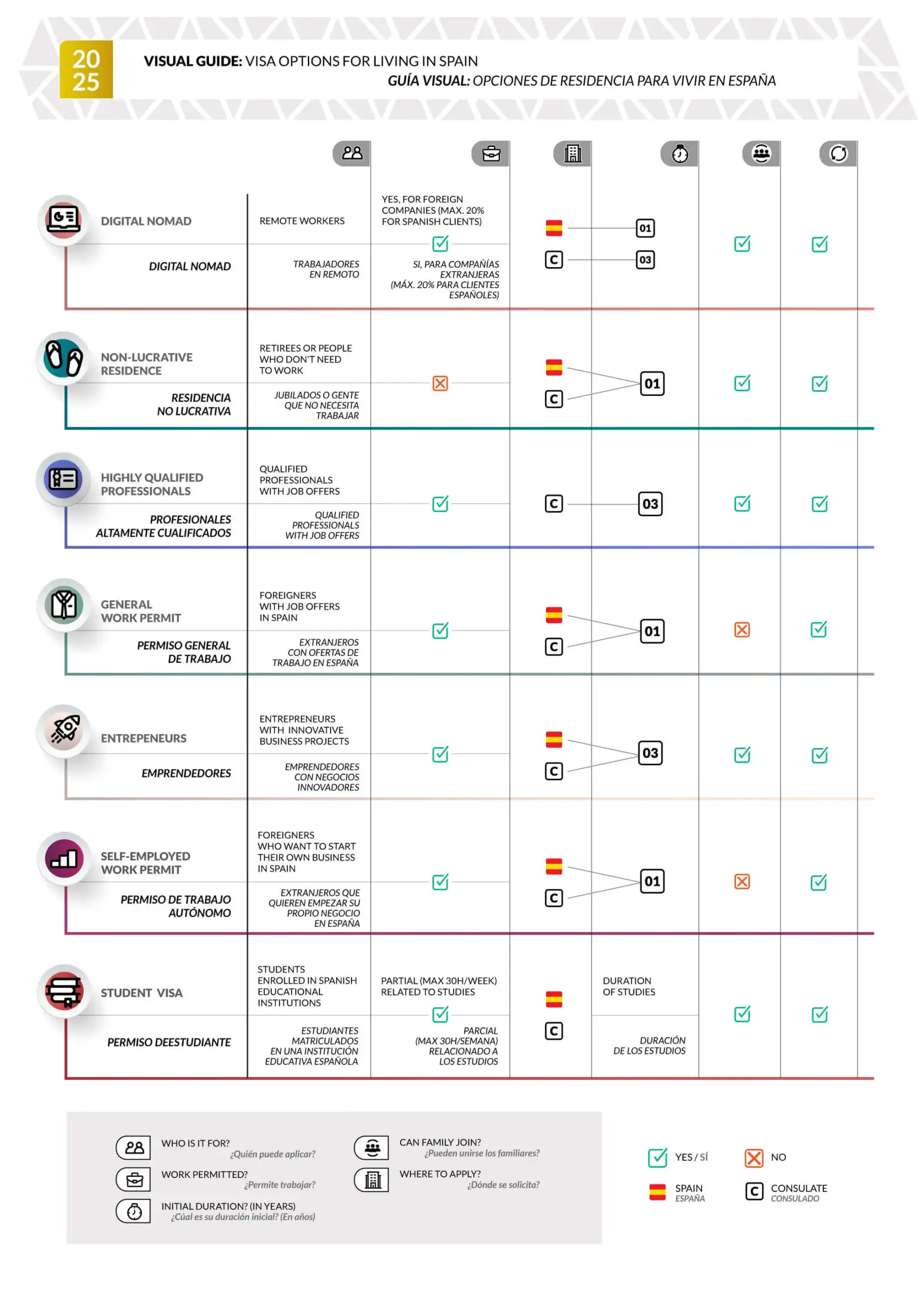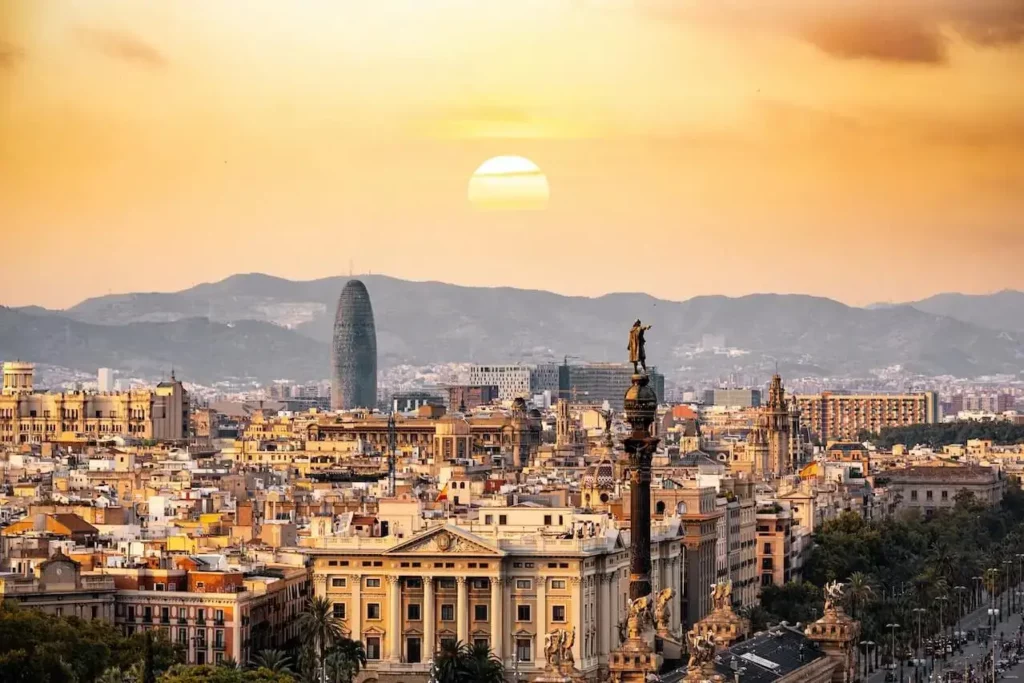Spain to end ‘golden visa’ program for non-EU investors in April 2025
On April 8, 2024, the President of the Spanish Government announced the end of residence permits for investors, popularly known as “Golden Visa”. Since then, many have faced uncertainty, wondering when this announcement would be implemented and under what conditions. Finally, on 3 January 2025, Organic Law 1/2025 on measures for the efficiency of the Public Justice Service was published. Among other measures, this law eliminates residence permits for investors. Consequently, as of April 3, 2025, it will no longer be possible to apply for a Golden Visa in Spain.
If you’ve already applied, don’t worry. Those who apply before April 3 will still be able to receive their permit, if they meet the established requirements. Also, if you already have a Golden Visa, you can keep your residence permit until the date of its expiration. However, according to the current wording of the law, it seems that only investors in real estate will be able to renew their permits once they have expired, since the legal text does not include other types of investors (such as those of public debt, shares, bank deposits or investment funds).
Faced with this scenario, many foreigners residing in Spain or who plan to move to the country wonder what alternatives exist to the Golden Visa. In this article you will find information about various options to reside and/or work in Spain from April 2025, depending on your situation and needs. When deciding which visa or authorization to apply for, it is essential to consider several factors to determine which one best suit your case.
Check out our FAQs at the end of this article to clarify any questions you may have.
The 2 most common alternatives to the Golden Visa:
The two most common alternatives to the Golden Visa are usually the Digital Nomad Visa or Authorization and the Non-Lucrative Visa.
The key difference between these two types of permits lies in whether you want to continue working or whether you prefer to retire or take a gap year, for example.
If these two options don’t convince you, that’s okay. Later in the article, we will show you equally effective alternatives, designed to adapt perfectly to what you need.
Digital Nomad Visa
The Digital Nomad Visa or Authorization is designed for foreigners who wish to reside in Spain while working for a foreign company or managing their own business located outside of Spain. The work must be done completely remotely, and applicants must prove that they have a university degree or at least three years of relevant professional experience in the field. Depending on your situation, you will need to be covered by your country’s social security system or register as a self-employed person in Spain and pay Spanish social security contributions.
One of the advantages of the Digital Nomad permit is that you can apply for it from Spain, as long as you are legally in the country, or from your country of origin or residence through the Spanish Consulate there. If you apply from Spain, you will receive a residence permit valid for three years, unless your employment relationship or social security coverage is for a shorter duration. If you apply from the Consulate, you will receive a one-year visa, after which you can apply for a residence permit. The Digital Nomad Visa or authorization is processed by the Large Companies and Strategic Groups Unit (UGE-CE), which reduces processing times. Another advantage of this permit is that, depending on your situation, you could qualify for more favourable tax treatment. For any tax-related queries, we recommend that you contact a specialized lawyer or a tax advisor.
Check out our detailed article “Digital Nomad Visa in Spain: All You Need to Know” for more details on this visa.
Non-Lucrative Visa
The Non-Lucrative Visa is intended for foreigners who wish to reside in Spain without carrying out remunerated activities. To obtain it, applicants must demonstrate that they have sufficient financial resources to support themselves during their stay without the need to work in Spain. This visa is ideal for those who wish to retire or take a gap year in the country. The initial duration of the visa is one year, and it can be renewed for additional periods of two years, if the financial and residency requirements are still met.
Unlike the Digital Nomad Visa, the Non-Lucrative Visa can only be applied for through the Spanish Consulate in your country of residence; it cannot be processed while in Spain. If, after one year, you decide to start working, you can change your Non-Lucrative Visa to another type of residence and work permit.
Check out our detailed article “How to convert your non-lucrative visa to a work permit” for more details on this visa.
Both the Digital Nomad Visa or Authorization and the Non-Lucrative Visa allow your family members to join you, as long as you demonstrate the necessary financial means. In addition, both permits offer the possibility of applying for long-term residence after five years of legal and continuous residence in Spain.

Other alternatives to the Golden Visa:
If neither of the two options mentioned is ideal for you, don’t worry. Here are equally effective alternatives, designed to best suit your situation and help you make the best decision.
Visa for Highly Qualified Professionals
Another alternative to the Golden Visa is the Visa or authorization for Highly Qualified Professionals. The main requirement to obtain this permit is to have a job offer from a Spanish company for a highly qualified technical position or a management position with a salary of more than €40,100 per year, or €54,200 per year for directors, unless you are under 30 years old, in which case the salary requirement could be lower. In addition, you must have a university degree or demonstrate at least three years of experience in the required area.
The Visa or authorization for Highly Qualified Professionals can be applied for from Spain if you are legally in the country, or from the Spanish Consulate in your country of residence. Like the Digital Nomad Visa, this permit is processed by the UGE-CE, which speeds up processing times. This visa also allows your family members to obtain a residence and work permit in Spain and, depending on your situation, could offer you more favourable tax treatment. Initially granted for three years, this permit can be renewed and is linked to the employer, which means that if you change jobs, you will have to start the application process again, which can also be done from Spain. After five years of legal and continuous residence in Spain, you will be able to apply for long-term residence.
Check out our detailed article “How to get a highly qualified professional work permit” for more details on this visa.
Work Permit under the general immigration regime
If your job offer does not meet the requirements of the Visa for Highly Qualified Professionals, you could consider applying for a residence and work permit under the general immigration regime. However, keep in mind that there are restrictions related to the catalogue of occupations that are difficult to cover.
Entrepreneur Visa
Another permit processed by the UGE-CE is the Entrepreneur Visa (also known as the Startup Visa), which can be applied for from Spain or through the Consulate. This permit requires an innovative business project with high growth potential and value in sectors such as technology, research, science, the digital economy or the creative sector. Your business plan must be approved by ENISA as an innovative activity of special economic interest for Spain.
This permit is initially granted for three years and can be renewed as long as the conditions are maintained. After five years of legal and continuous residence in Spain, you will be able to apply for long-term residency. Family members can also accompany you under this visa.
Check out our detailed article “How to get the entrepreneur visa in Spain” for more details on this visa.
Self-Employment Permit
If your business does not meet the requirements for the Entrepreneur Visa, you can apply for a residence and work permit as a freelancer under the general regime. In this case, you will also need to present a viable business plan.
Check out our detailed article “How to get a self-employed work visa in Spain” for more details on this visa.
Student Visa
If you are not sure what to do in the future, but you want to be in Spain, you can consider applying for a Visa or Study Authorization. To do this, you will need to enrol in a higher education institution, depending on your study interests. The Student Visa also allows your family members to accompany you in Spain, in this case, they must apply through the Consulate. The duration of the permit is linked to the duration of the course. Later on, you can change your student permit to another type of residence and/or work permit.
Check out our detailed article “From student visa to work visa in Spain: All you need to know” for more details on this visa.
Comparison of alternatives

Conclusion
In summary, although the Golden Visa will no longer be available in Spain as of April 2025, there are several alternatives for those who wish to live and work in the country. Options such as the Digital Nomad Visa, the Non-Lucrative Visa, the Visa for Highly Qualified Professionals and the Entrepreneur Visa offer different advantages depending on your profile and needs. In addition, there are other paths, such as the student visa or work permits under the general immigration regime. The key is to choose the option that best suits your situation.
If you need professional assistance in any immigration process, you can contact us using the form below, our contact page, or by phone. Our team of experts is ready to provide support and guide you through each step of the application process.
Frequently asked questions (FAQs)
Can I still apply for a Golden Visa in Spain?
Spain’s golden visa program will end on April 3, 2025. After this date, the Golden Visa will no longer be available. However, if you submit an application before the deadline and meet all the necessary requirements, your application will still be processed.
You can find more information here.
What if I already have a Golden Visa?
If you already have a Golden Visa, you will be able to keep your residence permit until it expires. However, according to the wording of the new law, only real estate investors will be able to renew it. Other types of investors are not currently included in the renewal process.
What are the most common alternatives to the Golden Visa?
The two most common alternatives are:
- Digital Nomad Visa – For remote workers employed by foreign companies or freelancers with businesses outside of Spain.
- Non-Lucrative Visa – For those who wish to live in Spain without working, such as retirees or people who want to take a gap year.
Can I work with a Digital Nomad Visa?
Yes, but only for a foreign company or for your own business outside Spain. You must demonstrate a university degree or at least three years of experience in your field.
How do I apply for a Digital Nomad Visa?
You can apply from:
- Spain, if you are legally in the country, obtaining a residence permit for 3 years (subject to conditions).
- Your country of origin, through the Spanish Consulate, obtaining a 1-year visa that can then be converted into a residence permit.
Can I apply for the Non-Lucrative Visa while in Spain?
No, the Non-Lucrative Visa must be applied for through the Spanish Consulate in your country of residence.
What do I do if I want to work as a salaried employee in Spain?
If you want to work as a salaried employee in Spain, you might consider:
- Highly Qualified Professional Visa – Requires a job offer in a specialized field with a salary in excess of €40,100 (€54,200 for managers).
- General Work Permit – Subject to labour market conditions and availability in professions with shortages.
Can I start a business in Spain?
Yes, through the Entrepreneur Visa. Your business must be innovative, with high growth potential and value in sectors such as technology, research, digital economy or creative industries. The business plan must be approved by ENISA.
If your business does not meet the requirements for the Entrepreneur Visa, you can apply for a work permit as a freelancer under the general immigration regime. In this case, you will need to submit a viable business plan and meet specific financial and legal requirements.
Can my family members join me on these visas?
Yes, the Digital Nomad Visa, the Non-Lucrative Visa, the Highly Qualified Professional Visa, the Entrepreneur Visa and the Student Visa allow your family members to join you in Spain. In the case of the Student Visa, the application of the family members must always be submitted through the Consulate.
What options do I have if I only want to stay temporarily in Spain?
If you want to experience Spain and learn, you can apply for a Student Visa. This visa will allow you to stay for the duration of the course and then switch to a residence or work permit if you wish.
How long do these residence permits last?
- Digital Nomad Visa: 3 years (renewable).
- Non-Lucrative Residence Visa: 1 year (renewable).
- Highly Qualified Professional Visa: 3 years (renewable).
- Entrepreneur Visa: 3 years (renewable).
- Student Visa: Valid for the duration of your studies.
Can I apply for long-term residency in Spain?
Yes, after 5 years of legal and continuous residence, you will be able to apply for long-term residence, which will grant you greater stability and benefits. For these purposes, we must point out that the Student Visa is a stay permit and not a residence permit.
This article has been written in collaboration with Xènia Rigola i Margalef, lawyer at Klev&Vera.




